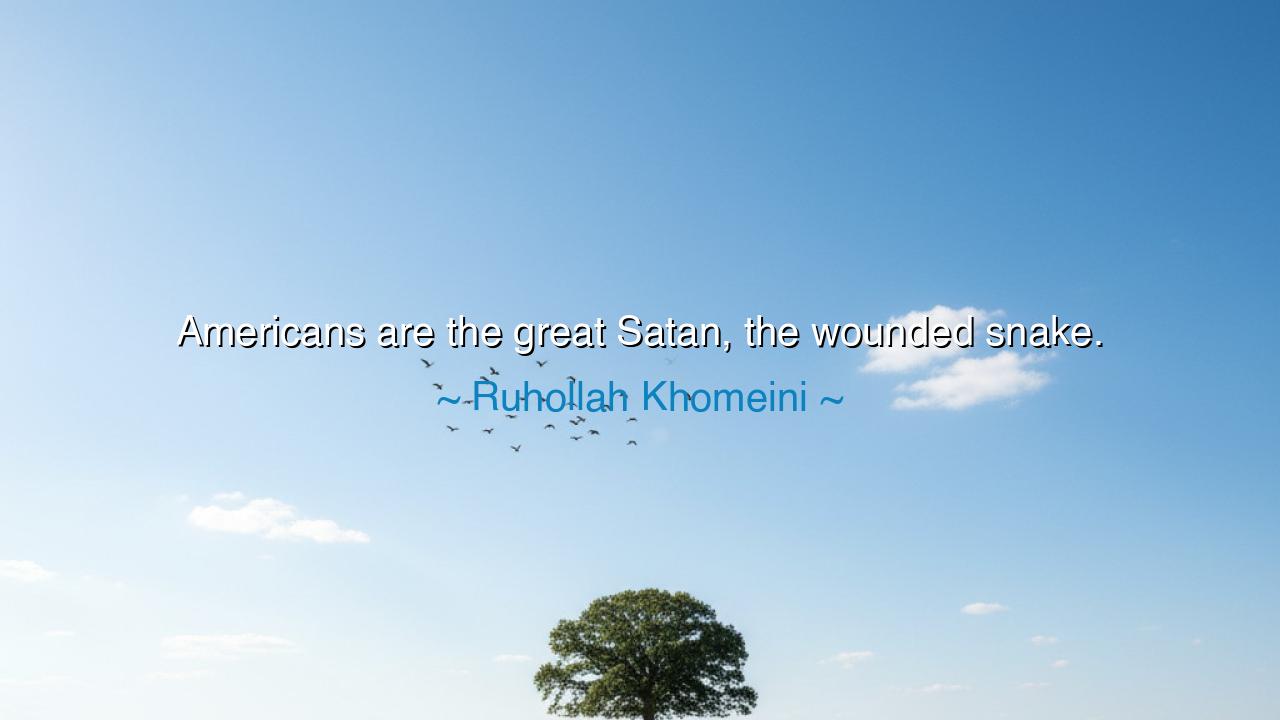
Americans are the great Satan, the wounded snake.






The words “Americans are the great Satan, the wounded snake” were spoken by Ruhollah Khomeini, the spiritual and political leader who ignited the Iranian Revolution of 1979. To the modern ear, these words sound fierce and uncompromising — and indeed they are. But beneath their fire lies not merely insult or hatred, but the language of symbolism, born of suffering, pride, and resistance. Like the oracles of old, Khomeini spoke not as a diplomat but as a prophet, framing political conflict in the moral vocabulary of good and evil, of divine justice and corruption. His words sprang from the wounds of a nation long burdened by foreign influence, and they echo still, heavy with both anger and warning.
To call a power “the great Satan” is to cast it not only as an enemy, but as a tempter — a being that seduces and corrupts rather than destroys openly. In this phrase, Khomeini sought to name the United States not as a mere rival, but as a force of deception, cloaked in promises of freedom and progress, while spreading what he saw as moral decay and spiritual emptiness. It was a rebuke not only of military or political dominance, but of Western materialism, the worship of wealth and desire that he believed had poisoned both East and West. To him, America was not simply powerful — it was fallen, and its fall threatened to drag others with it.
Yet, in the same breath, he called it the “wounded snake.” Here lies the paradox — a creature dangerous still, but no longer whole. In the old texts of Persia and beyond, the snake is both feared and revered: the bringer of wisdom and death, the guardian of secrets, the symbol of temptation. To call it wounded is to suggest that its power is diminished, its arrogance pierced. Khomeini saw the United States as vast and fearsome, but also spiritually crippled — mighty in weapons, yet broken in soul. Thus, his metaphor carried both condemnation and prophecy: that even empires of great might will one day writhe in their own corruption, undone not by swords, but by their own pride.
The origin of such words cannot be separated from the story of his time. For decades, Iran had lived under rulers who, in the eyes of many, bowed too readily to foreign will. The 1953 coup, supported by the CIA, toppled the nation’s elected leader, Mohammad Mossadegh, and restored the Shah, whose rule became a symbol of Western dominance. The bazaars, the mosques, and the hearts of the faithful filled with resentment, not only against the ruler who oppressed them, but against the distant power that armed and enriched him. When Khomeini rose to speak, he gave voice to this buried rage. His words were fire to a people who felt robbed of their dignity — a cry not just against America, but against submission itself.
History offers many such cries. The ancient prophets of Israel spoke in similar tones against Babylon and Egypt; the poets of Greece cursed the arrogance of kings who challenged the gods. Even in Rome’s twilight, voices rose warning that the empire’s greatness was its own undoing. Khomeini’s metaphor belongs to this same tradition: the moral framing of worldly struggle, the vision of history as a battlefield between righteousness and corruption. Whether one agrees or not with his judgment, one must recognize its power — for such words do not merely describe; they summon, they shape, they awaken.
Yet within this fury lies a deeper reflection on empire and humanity. Every civilization that rises to power risks becoming, in the eyes of others, a kind of “great Satan” — a force that believes its dominance is virtue. When strength forgets humility, when wealth forgets compassion, when innovation forgets morality, then even the brightest empire becomes a wounded serpent, striking blindly, its venom turned inward. Thus, the lesson of Khomeini’s words is not for one nation alone, but for all who wield power: beware the corruption of pride, for moral decay often walks hand in hand with material triumph.
And so, children of tomorrow, learn from this: the voice of wrath is also the voice of warning. When a people call another “the great Satan,” listen not only to the hatred, but to the wound beneath it — the wound of exploitation, of spiritual hunger, of pride untempered by empathy. The wise do not meet insult with insult, but seek to understand what pain gave birth to such fire. For peace does not come from silencing the angry, but from healing what made them cry out.
Thus, let the quote of Khomeini be read not only as condemnation, but as a mirror of civilization. Every age produces its “great Satan” — the mighty empire whose shadow falls across the earth. And every age must decide whether it will be the serpent that heals, or the serpent that wounds. Remember this, and walk humbly: for even the most powerful must one day face the judgment of history — and it is not the strong, but the righteous, who endure.






AAdministratorAdministrator
Welcome, honored guests. Please leave a comment, we will respond soon